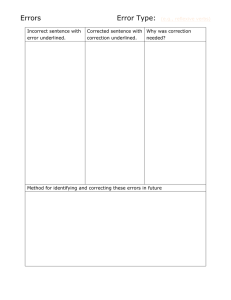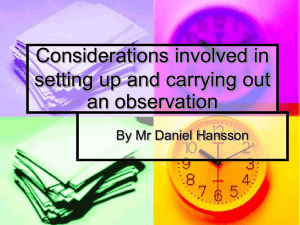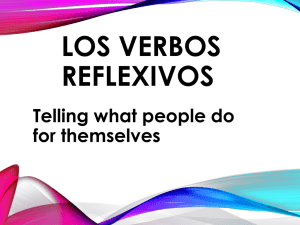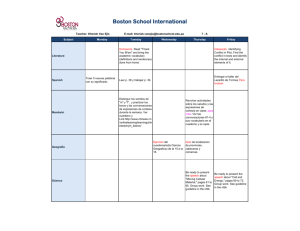Reflexive Verbs Realidades-Capítulo 2A Español 2 VIDEO: Reflex your verby
advertisement
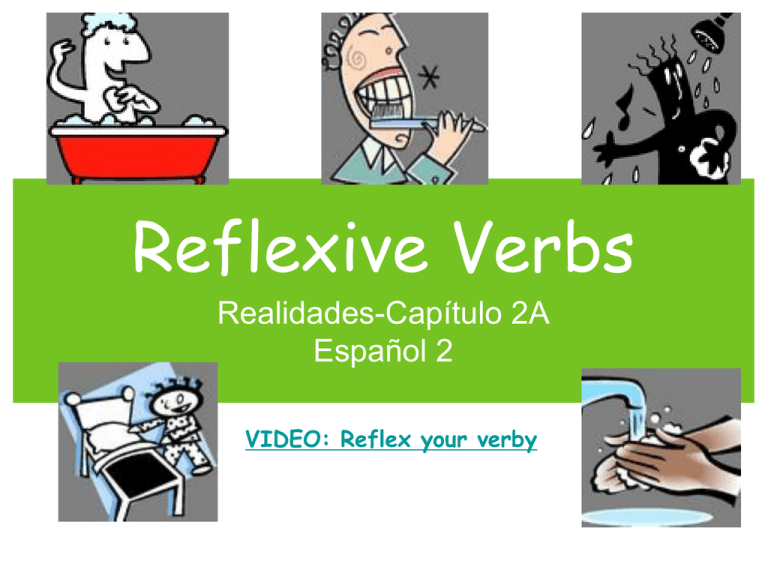
Reflexive Verbs Realidades-Capítulo 2A Español 2 VIDEO: Reflex your verby Reflexive Verbs: • We use reflexive verbs to say that people do something to or for themselves. • For example, washing one’s hands and brushing one’s hair are reflexive actions because the doer is the receiver. Nobody else does it for you! • All reflexive verbs end with -se. -lavarse -ponerse -prepararse Let’s identify the reflexive verbs.. 1) lavar not reflexive 2) arreglarse __ 3) limpiar reflexive not reflexive 4) prepararse __ 5) poner 6) levantar reflexive not reflexive not reflexive Por la mañana el hombre... Despertarse y levantarse ducharse cepillarse los dientes También, él…. afeitarse vestirse ¿ Qué prefieren ustedes? 1) ¿A quién le gusta levantarse tarde? ¿A qué hora? 2) ¿Prefieren usar Colgate o Crest para cepillarse los dientes? 3) ¿A quién no le gusta ducharse con agua fría? 4) Chicos, ¿necesitan afeitarse la cara frecuentemente? 5) ¿Les gusta vestirse simple o elegante a las fiestas? La mujer.... lavarse la cara arreglarse el pelo ponerse el maquillaje o maquillarse levantarse ducharse afeitarse cepillarse los dientes vestirse Todos los días... despertarse acostarse levantarse dormirse Cada noche.... bañarse acostarse dormirse Más verbos reflexivos pintarse las uñas secarse el pelo ponerse el suéter Más verbos reflexivos quitarse el maquillaje (to remove) cortarse las uñas ponerse perfume ¿Cuánto sabes? Selecciona la palabra apropiada. a. vestirse b. acostarse c. ducharse d. cepillarse los dientes e. levantarse f. ponerse el maquillaje g. bañarse h. arreglarse el pelo 1. c. 5. e. 2. h. 6. 3. f. a. 4. b. g. d. 7. 8. How do you change these verbs? lavarse (to wash oneself) 1) remove the -se lavar 2) next, conjugate (add the appropriate ending for –AR/-ER/-IR verbs) (Yo) lavo 3) then add the reflexive pronoun and rearrange Yo me lavo la cara cada mañana. ( I wash my face every morning.) **Put reflexive pronouns before the conjugated verb. Reflexive Pronouns: me (myself) nos (ourselves) te os (yourselves-Spain) (yourself-informal) se (him/herself yourself-formal) se (themselves/ yourselves) 1) Put reflexive pronouns before the conjugated verb: Me ducho. 2) Or, attach them to the infinitive when you have 2 verbs. Yo quiero ducharme. . Let’s conjugate! 1) 2) 3) arreglarse tú arreglar arreglas tú te arreglas Let’s conjugate! 1) 2) ponerse él poner pone 3) Él se pone la camisa negra. Conjuguemos: Secarse: to dry oneself Conjuguemos: Lavarse: to wash oneself (Yo) (nosotros ) me lavo (Tú) te lavas (Ud.) (Él) (Ella) se lava (nosotras) (vosotros) nos lavamos os laváis (vosotras) (Uds.) (Ellos) (Ellas) se lavan Conjuguemos otro más : Ponerse: to put-on oneself (Yo) (Tú) me pongo te pones (nosotros ) nos ponemos (nosotras) (vosotros) os ponéis (Ud.) se pone (vosotras) (Uds.) se ponen (Él) (Ellos) (Ella) (Ellas) ¡Importante! • When you use a reflexive verb with parts of the body or clothing, use the definite article (el, la, los, las) of the noun instead of a possesive adjective (mi/mis, tu/tus, su/sus, nuestro,a,os,as). Ejemplos: 1) Siempre me pinto las uñas. 2) Felipe se pone sus los zapatos. 3) ¿Te lavas tus las manos? 4) Nos ponemos los jeans. Práctica Conjuga cada verbo reflexivo. 1. Yo (lavarse) las manos. 2. Tú (cepillarse) los dientes. 3. Elena (ponerse) el vestido. 4. Nosotros (pintarse) las uñas. me lavo te cepillas se pone nos pintamos 5. Vosotros (dormirse) a las diez. os dormís 6. Ellos (arreglarse) rápidamente. se arreglan Verbos “bota” (stem-changers) (O->UE) (E->IE) acostarse (to go to bed) despertarse (to wake up) me acuesto nos acostamos me despierto nos despertamos te acuestas os acostáis te despiertas os despertáis se acuesta se acuestan se despierta se despiertan (E->I) vestirse (to get dressed) me visto nos vestimos te vistes os vestís se viste se visten Let’s conjugate! 1) 2) vestirse él vest 3) él 4) vestir vest viste Él se viste rápidamente. Let’s conjugate! 1) acostarse 2) Uds. acostar acost 3) acost Uds. acuest an 4) Uds. se acuestan tarde. Conjuguemos: Divertirse: to have fun / enjoying oneself (Yo) (Tú) (Ud.) me divierto (nosotros ) te diviertes (nosotras) (vosotros) se divierte (vosotras) (Uds.) (Él) (Ellos) (Ella) (Ellas) nos divertimos os divertís se divierten Práctica Conjugate the following reflexive verbs. 1. Yo (vestirse) en cinco minutos. 2. Tú (acostarse) muy tarde. me visto te acuestas 3. Ud. no (vestirse) muy bien. se viste 4. Nosotros (despertarse) a las seis. nos despertamos 5. Pedro (acostarse) después de leer.se acuesta 6. ¿Quién (despertarse) con el despertador? se despierta • Some verbs have both reflexive and non-reflexive forms and usages. A verb is used in its non-reflexive form shows that the action is being done to someone or something else. Ejemplos: -Yo lavo el coche cada dos semanas. (non-reflexive) -Me lavo el pelo todos los días. (reflexive) -Se cepilla los dientes tres veces al día. (reflexive) -La mamá cepilla el pelo de su hija. (non-reflexive) Reflexives with 2 Verbs: When you have 2 verbs, you can put the reflexive pronouns before the verbs or you can attach them to the infinitive (2nd verb): Ej.1 Me voy a duchar. Voy a ducharme. Ej.2 Te tienes que vestir para la fiesta. Tienes que vestirte para la fiesta. Ej.3 Se acaba de levantar. Acaba de levantarse. Ej.4 Nos queremos poner un abrigo. Queremos ponernos un abrigo. Position of the Reflexive Pronouns: •1. In front of a conjugated verb: •Me acuesto a las diez de la noche. •Se quiere acostar a las diez de la noche. •2. Attached to an infinitive: •Voy a acostarme ahora mismo. •Luisa va a cepillarse los dientes. Práctica con 2 verbos: • Vuelve a escribir las siguientes oraciones poniendo el pronombre reflexivo antes o después de los 2 verbos. • EX. Elena se tiene que maquillar. Elena tiene que maquillarse. 1. José se va a duchar. José va a ducharse. 2. Yo voy a arreglarme el pelo. Yo me voy a arreglar el pelo. 3. Elena e Isabel siempre se tienen que preparar lentamente. Elena e Isabel siempre tienen 4. Tú acabas de vestirte. prepararse lentamente. Tú te acabas de vestir. que ¿Puedes contestar las preguntas…? 1. ¿A qué hora te levantas por la mañana? 2. ¿Qué haces cuando vas a una boda? 3. ¿Quieres acostarte ahora? 4. ¿Quién en tu familia se pone maquillaje? 5. ¿Uds. se lavan las manos antes de comer? Juego: “Dados” 1) Busca a un compañero con el mismo color de pantalones. 2) Decide quién juega primero. 3) Tira los dados y conjuga los verbos. Tomen turnos. 1. los jóvenes 1. arreglarse 2. yo 2. bañarse 3. mi hermano 3. cepillarse los dientes 4. tú 4. levantarse 5. quién 5. ponerse el sueeter 6. nosotras 6. vestirse Ve el siguiente video de “Youtube”: • http://www.youtube.com/watch?v=KATBgZ5oyIg
